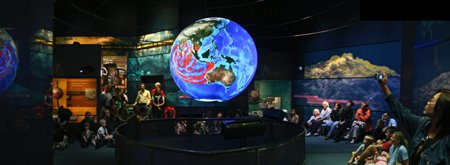Has Science Disproved Religion?
The real assumption in this question is clear: Surely the discoveries of modern science have proved that biblical religion is untenable. Yet, there are fundamental false assumptions built into the question itself. The most obvious of these is the popular belief that the scientific method can actually prove things.
As empirical science rests on what philosophers call the inductive method, scientific conclusions never offer certainties, only probabilities. Induction is the principle of scientific inquiry that begins with specific observation in order to offer a generalisation about the thing observed.
For example, all the dogs I have encountered have four legs, so I conclude with the generalisation that all dogs have four legs. But my conclusion is not deduced from a universally known truth; it is based on limited exposure to the facts and so is only a statement of probability.
As it happens, there are dogs born with three legs, or injured and left with three. Inductive scientific methods cannot prove with certainty. Furthermore, the past is not directly accessible to us, so all theories concerning origins and earth history are hypotheses, not facts. And predictions about natural processes in the future are based on philosophical assumptions (faith).
Though these things are understood by philosophers of science, the general public is often unaware of the nature of the scientific enterprise. Most people asking this question assume that Christianity is a blind leap in the dark. Christianity, they say, is not concerned with evidence, but is believed in the absence of evidence, or even contrary to the known facts. Faith is not, however, a leap. Rather, it is a foundation. All science is based upon a faith of some kind. For example, we must believe that there is a real world of matter out there that is accessible and correlated to our senses. We must believe that our minds are giving us reliable information about the world. We must believe that language and mathematics, reason and logic can all be applied to the world of our senses.
In fact, the most basic assumption of the sciences is the uniformity of nature – the expectation that the present and future will be like the past. But none of these things are proved by natural science – they are believed on faith. It is because we believe these things that science itself is made a meaningful and intelligible discipline.
Since science is based upon faith assumptions (metaphysical beliefs) that cannot be proved, we need to ask a different question: What kind of faith provides an adequate foundation for science? And, importantly, how does each person’s religious view of the world affect their methods and conclusions in science?
To answer these questions, we must set the presuppositions of these differing faith systems side by side. Every person, scientist or not, necessarily nurtures a religious perspective made up of a number of interconnected beliefs – what we call a worldview. The two worldviews represented in this question are naturalism and Christian theism.
Naturalism holds that matter and energy is all there is. The whole universe is in flux, matter in motion. Everything we observe in the universe created itself from chaos. The universe is the product of chance, not design. Human beings are nothing more than a random collocation of atoms. In contrast, Christian theism holds that the God of the Bible is the creator, sustainer and redeemer of this world. Rather than the void of chance, the mind of the triune God creates, orders and sustains all that is.
So there are two divergent starting points. In the first case, the mind of finite man must be the ultimate criteria for truth, applying abstract laws to the irrational facts all around him. He puts his faith in himself as god, creating a reality for himself. The Christian theist places his faith not in himself, but in the God of creation. So man does not create knowledge or fashion the universe from his own mind, but rather he looks to God as the ultimate source of all knowledge, and reality.
Facts do not speak for themselves.
People with each worldview are looking at the same data or evidence. However, the facts do not speak for themselves; they are interpreted according to a worldview. Thus, when the naturalistic thinker looks at the evidence, he interprets everything accordingly. He claims, for example, that he does not see design in the genetic code, just selfish genes and random replication. He claims not to see God revealed in the heavens, he sees cosmic evolution. To him all facts must be naturalistic and evolutionary to be facts at all. The Christian theist, on the other hand, sees all the evidence as pointing to God. Facts are not interpreted by the finite and everchanging thinking of people, but pre-interpreted by the mind of God and read in the light of God’s revelation in Scripture.
So the idea that science and religion are opposed is a myth. Naturalism as a religion has its science, and the theist has his science. It is one faith or religion that opposes the other, not an objective scientific establishment that opposes religion. The real heart of the issue is this: Which faith makes scientific knowledge possible? If the universe is ultimately chaotic – if all is in flux – then you cannot finally know anything. How can we believe in the uniformity of nature in a chance-driven universe? How can we trust that the chemical accident of our brain is giving us valid knowledge? If all matter is in motion, how can we apply abstract, universal laws of mathematics and logic to reality?
It is the Christian worldview alone that can provide the pre-conditions of intelligible science. It is God who provides the order, structure and regularity that make the cosmos rational. And he has made us in his image, with mind and spirit distinct from matter, capable of exploring and understanding the world. It is the God-given nature of man living in God’s world that makes science possible. Without such a faith there is no science to speak of.
© 2005 idea magazine



